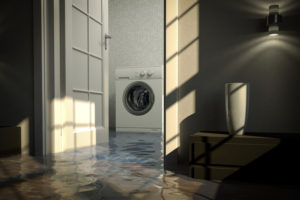Serving Charlotte, Monroe, Concord &
All Of Mecklenburg County
Menu

Water follows the path of least resistance as gravity pulls it downhill. Unfortunately, when excess water accumulates in the bottom floor of your home, your home and possessions can be damaged or destroyed. Often, it is a result of outside water falling as rain or snow that makes its way inside. As little as 1 inch of rain can bring 1,250 gallons of water pouring down onto a 2,000 sq. ft. home. Without proper home maintenance, even a modest rainstorm might flood your basement.
Many other sources of water can cause damage in your lower levels; the longer the water sits, the more damage it can do.
HVAC systems produce a lot of condensation, check drain pipes often. Your clogged furnace could damage drywall, floors, and overall air quality. Other sources of humid air can include dryers, showers, cooking, and humidifiers.
Always check for inside leaks first when trying to identify the cause of moisture in your basement. A water leak can come from numerous places: a shower, a sink, a toilet, a washing machine, or dishwasher. Often, if the moisture in your basement is located on the ceiling beneath a bathroom or kitchen, an interior water leak is to blame.
Pay attention to the hot water heater; the tanks hold 30 to 50 gallons of water. Most last about 10 to 12 years; all hot water appliances wear out over time. You face a potential slow leak or even a catastrophic failure when the bottom of the tank rusts out.
If gutters and downspouts are missing, clogged or poorly designed, rainwater gets directed towards your foundation instead of to the storm sewer. A minimum of 1 downspout should be placed per every 50 ft. of a roof eave. Extenders should be placed on all downspouts, sending water at least 4 ft. away from the foundation.
If water accumulates against the foundation walls, and that pressure (hydrostatic pressure) can force the water into the walls, creating cracks. No matter how the cracks formed, water can enter your basement through them, enlarge them and create a snowball effect of damage.
When moisture accumulates outside between the soil and the walls, pressure pushes down on that moisture, causing it to look for a way to escape. As the pressure builds, moisture is pushed through cracks in your walls and floors. In finished basements, check for stains, discoloration, and deterioration of drywall, paneling, and carpeting for signs of water damage.
No matter what type of landscape your home was built on, the soil surrounding your foundation should always slope away from the home. A slope of just 6 inches down will guide water away from your home, rather than allow it to pool.
New homes are the most vulnerable. If the fill dirt around your foundation isn’t properly compacted, the dirt settles water flows toward your house rather than away from it.
A blockage in your sewer line can cause a sewage backup into your basement. Grease, hair, and other items can clog the line, tree roots can crack and growth through them, and even municipal sewers can back up into your home.
Sump pumps help prevent water from collecting around your foundation. Channels along foundation walls direct water to a well. When the pit fills with water, the electric pump is activated, pumping the water away from the area. If the pump malfunctions, water can flood your basement.
While windows allow much-needed light to flow into your basement, they can also allow water to make its way in as well. Windows should be properly sealed and free of cracks. The window wells, the areas around your basement windows, should have proper drainage in place, allowing water to flow away from the home, and not pool in the wells.
If you find any unexplained or excess water in your home, call for help. Basement water damage can cause serious structural damage. When not addressed immediately, mold and mildew can form. You need to get the professionals involved right away; Restoration 1 provides certified water damage restoration services in Greater Charlotte.
At Restoration 1, the team designs a plan for your home that ensures your property is 100% dry by using the best equipment in the industry. As soon as you discover a leak or water damage, call Restoration 1.